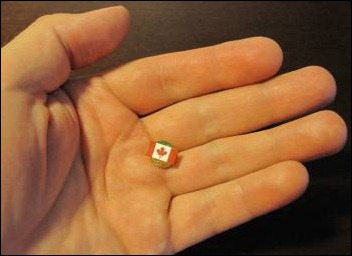Ambient Nationality
When I logged out of Hotmail on Sunday morning (yes, I still use Hotmail, though only for lists and personal email), an odd thing happened: I was taken to a rather boring Bing page telling me about movies in the Madison area. This is not what’s meant to happen. Usually, and despite living outside Canada since 1999, Hotmail logout has led me to an MSN Canada page.
 I usually click off that page in a few seconds, largely disinterested in and by the news of Canadian Idol contestants, small political rumblings in Saskatchewan, and news of the latest exchange rate between the US and Canada. It’s not an important part of my media diet, in other words. Or, rather, I didn’t think it was.
I usually click off that page in a few seconds, largely disinterested in and by the news of Canadian Idol contestants, small political rumblings in Saskatchewan, and news of the latest exchange rate between the US and Canada. It’s not an important part of my media diet, in other words. Or, rather, I didn’t think it was.
But the experience of having this tiny bridge to my nationality unceremoniously destroyed has bothered me. I’m realizing how important that page was for letting me feel Canadian in very small ways for very small time segments (which, after all, is how Canadian nationality tends to work, no?). I’ve long lectured about expat, transnational, and hybrid media in my classes, usually popping in the opening scenes of East is East or Salaam Namaste, discussing my enthusiasm for CBS’s airing of Flashpoint (a sniper procedural in which guns rarely ever get used: how Canadian can you get), or talking about international sporting events. But now I see the lynchpin that this simple website plays in helping me feel Canadian.
For all the interest in grand national statements, we might also ask about the least amount of media that expats need to feel connected. I used to think I just needed to be somewhere with a hockey team, not because I actually or necessarily care to follow the team, but because it means that my everyday life will occasionally involve seeing a hockey jersey, hearing someone talk about an amazing deke, or so forth. There’s very little Canadian content that I actively seek out. I feel, instead, that I just want a faint background of Canadianness. Here, Colin Tait’s 1/5 rule comes into play too (he notes that usually 1 out of 5 cast members in any TV show is Canadian). And now I have the very mundane, frequently full of nonsense, MSN Canada homepage missing.
Which makes me wonder if we’ve been approaching transnational engagements with media from a limited perspective. For all the interest in using foreign media to immerse oneself in a foreign nationality – an interest expressed both by academics studying transnational media consumption, and by racist critics who think that Univision or Cinco de Mayo celebrations aren’t “American” enough – perhaps what a lot of us want/need is simply a background, faint, weak, unobtrusive ambience. Put another way, if any given individual’s experience of national identity may be ambient, appreciating a national dish here, a hat-tip to local knowledge there, perhaps much transnational media use is similarly about encounters with the ambient and the mundane, not (just) the big and showy?




Very interesting post, Jonathan.
I like this ‘ambient nationalism’ concept. It reminds me of Billig’s ‘banal nationalism’ theory, though it seems to also suggest the importance of contrast to national identification. This is something that I have been thinking about of late as a driver of national identification via distinction. This is to say that if one goes through the standard Hotmail site and then emerges to the Canadian MSN homepage, one might feel Canadian by virtue of the contrast between the email client and the Canadian content on this page. Another example would be CBC-TV as a Canadian network that might resonate that much more strongly for its position within a cable telescape that is dominated by US content (even the CBC itself carries much US content). My thinking is that the contrast is critical here as it facilitates a mode of identification that is based on simultaneously recognizing what one is and what one is not in national terms.
I guess that this not really ambience, but opportunities for national identification based upon distinctions between similar texts. Still, I think that this idea alludes to the same sort of phenomenon; subjects really need opportunities to identify with the nation, whether actively or in a more subtle manner. The elements that contribute to this ‘ambience’ may seem weak. Yet they may also provide critical cues that allow the subjects of ostensibly marginal national entities to utilize media products and services provided by dominant entities while retaining a slight and unobtrusive sense of national identification.
Along a similar line of thought, Asu Askoy and Kevin Robins discuss Banal Transnationalism (one working paper is available online (http://www.transcomm.ox.ac.uk/working%20papers/WPTC-02-08%20Robins.pdf) but they also have a chapter in the book Transnational Television World). In their example of Turkish migrants watching Turkish television, the viewers’ motivation was not the reinforcement of a Turkish identity, but a way to make Turkish culture ordinary again. It is worth exploring I think, as you point out, that there is an appeal to having media from foreign sources as simply “there” in our media diets.
The kinds of media we use to engage with foreign nations, however, is also a question worth investigating (and I am writing from India at the moment where I’ve been engaged in a lot of discussions about contentious nationalism). Consuming some “home nation’s” media while living in the diaspora, one usually knows where it fits into the broader media picture. It is harder, though not impossible of course, to fit the media we can find from other countries into the greater pop cultural context from which they emerge. I am not saying that negates the appeal of the ambient, but is perhaps a dimension worth considering as well.
I understand how you feel when you say that going to an event or hearing news about where you come from makes you feel ambient to your nationality but only up to a certain degree because you are who you are no matter what. For example, whether you hang up a Canadian flag in your room or not, does that make you feel any less or any more of a Canadian? I understand that a person can feel satisfied and happy in terms of celebrating their culture by going to a parade that celebrates their culture because their community is acknowledging their culture but I have to agree with the first post when the person says that this idea of ambiance is kind of weak.
I disagree with the idea that I am who I am no matter what if that means that I am incontrovertibly Canadian. After all, nationality isn’t something that I need to feel. (Especially, perhaps, for me, since I grew up in 5 countries, have 2 citizenships and passports, and live in another country with eligibility for a 3rd). Instead, I like to feel it, but only in small ways and at certain times. Sure, I could create those times, but that might feel a lot more contrived. So, yes, it is weak nationality and weak identity, but that’s what I’m seeking.
The notion of ‘ambient nationalism’ is definitely a valid point, particularly in the context of an ever-expanding multiculturalism. The media undoubtedly constitute an essential element in the construction of national identity. The access to national media, specifically via the internet, provides expatriates and migrants an opportunity to keep in touch with their roots, at least to a certain extent. It may be interesting to explore whether this connection derives from a conscious yearning, an expression of homesickness or an acknowledgement of cultural practices, or a subliminal, internalized automatism. When I studied in the United States, I made an attempt to completely immerse myself in the endemic culture. I purposefully avoided any contact with German media (and I did not speak a word of German, for that matter). Admittedly, I generally gravitate towards American media outlets anyway. Nevertheless, every Sunday, I found myself checking the weekly soccer results. And I am not a soccer aficionado. But apparently this rather banal, yet inveterate, German practice supplied me with an ambient sense of nationality.
The concept of ambient nationalism, in my opinion, is discernible in current American (and German) television shows and films as well. Some large-scale shows boast multicultural casts, i.e. LOST, HEROES, FLASH FORWARD. In 30 ROCK, Liz Lemon occasionally employs a German accent and converses with German caricatures. German series frequently utilize stereotypes associated with migrant minorities, for both dramatic and humorous effect. And the Oscar-winning film CRASH belabors the issue of intercultural urban conflict. In this respect, it is questionable whether the degree of ambient nationalism maintained in these media products actually provides a source for identification, an outlet for a cultural connection. Do expatriates require accurate depictions of their culture or are they content with parody? When do they take issue with the rendition of their culture? And how does it affect their self-concept? These are questions that I find particularly interesting.
Great post Jonathan. I definitely relate to some degree, and have always liked your concept of national ex-pat cultural sensitivity.
Sounds like “ambient nationalism” is similar to Mark Granovetter’s concept “the strength of weak ties,” fits in. He basically argues that where he argues that the little, parenthetical ties (like news from Saskatchewan)ends up being just as influential to your life than the strong ones like family.
I mentioned your article to my wife, whose hotmail settings have been effectively “Americanized” and she told me that if you change your hotmail location back to Canada (I never changed my settings, so I still get the Canadian feed) you may be able to receive ambient national signals yet again!
Amusingly, Colin, they’ve reverted without me doing anything. Maybe Bill Gates reads Antenna, and hooked me up? 😉